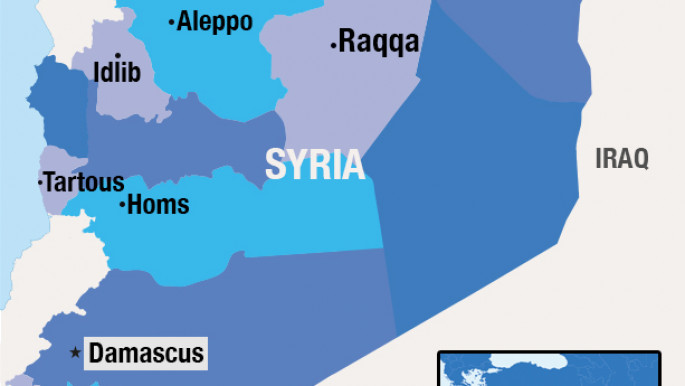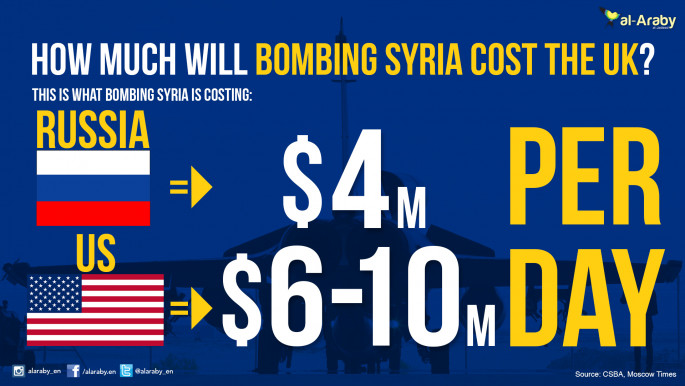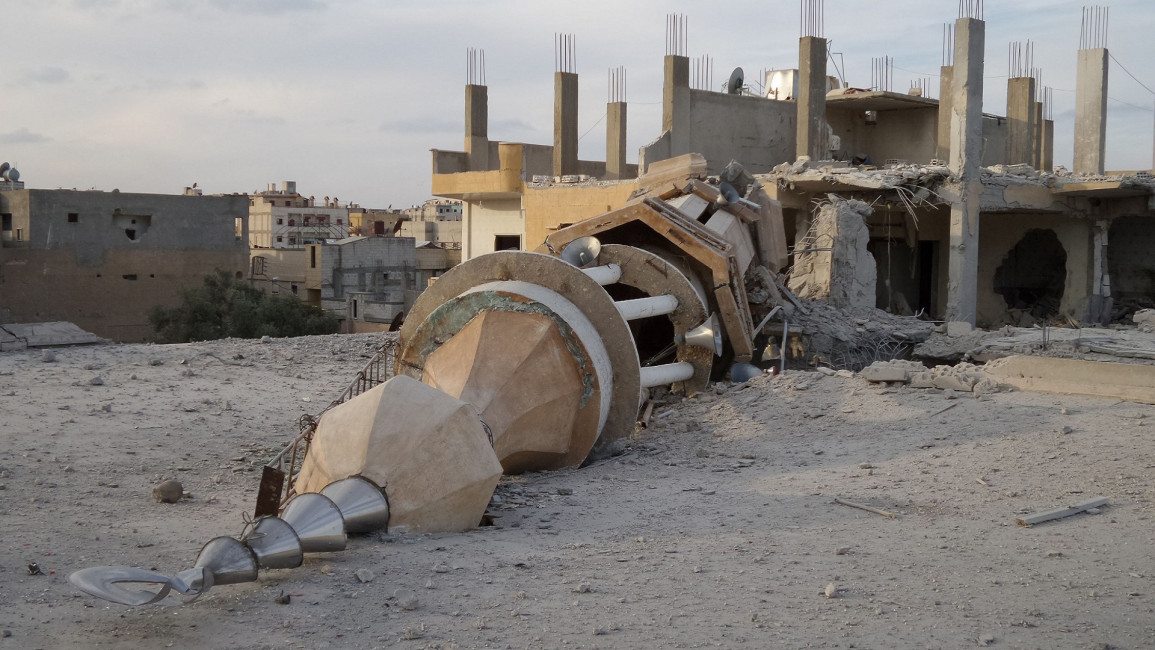No more bombs say Raqqa's people
No more bombs say Raqqa's people
As Britain commences its aerial bombardment of IS targets in Raqqa and elsewhere in Syria, many Raqqans are vehemently opposed to further bombing of their city, decrying it as futile.
5 min read
Raqqa has suffered immense destruction, from regime strikes to coalition and Russian air raids [Anadolu]
It may be too early to talk about the impact of UK airstrikes on the civilian population in Islamic State-held Raqqa, but Raqqans both inside the city and outside are already anxious.
True, it is likely British strikes, which add little firepower to the anti-IS operations already underway by the US-led coalition, will be more precise than either Syrian regime or Russian raids.
The British strikes on Thursday morning did not lead to reports of civilian casualties.
But advanced precision weaponry or not, airstrikes on a populated city like Raqqa will most certainly kill civilians, and in no small numbers either.
UK-based monitor Syrian Observatory for Human Rights (SOHR) puts the number of civilians killed in coalition airstrikes in Syria already at close to 400 since September 2014.
The number of Syrian civilians killed by Russian warplanes is at least twice that figure.
There is an estimated 500,000 people in the city, and one million people in Raqqa province, including almost 150,000 children.
During the debate on UK intervention in Syria, leader of the opposition Jeremy Corbyn quoted a refugee from Raqqa, who urged him to ask the prime minister whether he could guarantee the safety of his family in the city.
Even the recent focus on oil facilities controlled by IS, apart from questions about its effectiveness, will have both a direct and indirect toll on civilians.
"Can someone really be happy if his city is bombed by everyone? No," Abu Ahmad, identified as a refugee from Raqqa, told The Observer last week.
"Everybody bombed Raqqa. Anyone who was just annoyed by their wife decided to come and bomb Raqqa. Jordan, UAE, US, Russia, France," he added.
"Why is this just in response to ISIS? Why was no one moved when the regime was bombing us in Syria? Is it just because [terror] came to western countries? For us, it doesn't matter which bombs are killing us," said Mona, a teacher and activist also from Raqqa.
The British newspaper was speaking to a number of Raqqan exiles in Turkey ahead of the debate in the British parliament.
Most of them feared that more bombs would cost more innocent lives in a city where the civilian population is now held prisoner by IS "to serve as a human shield."
Many were baffled and frustrated that the city's fate was being decided in distant capitals and conference rooms where the people of Raqqa have no presence or a voice.
Electronic embargo
Acording to the Raqqa Post, an online outlet covering news from the city, IS has emposed an "electronic embargo" on Raqqa as Russia, France and now the UK stepped up their airstrikes.
Activists quoted by the Raqqa Post said IS shut down all internet cafes to carry out "security checks" on their computers, to prevent locals from broadcasting news.
Meanwhile, tough security measures imposed by the jihadist de-facto rulers of the city have forced people to remain homes.
The activists said IS is preventing civilians from fleeing the city and other areas under its control, including by destroying their travel documents.
A wiser course of action
Apart from the concern for civilian casualties, many Syrians are anxious because the strikes are not part of a strategy to oust Assad, who has arguably killed orders of magnitude more civilians than IS and other jihadists.
Many believe the best course of action would not be more airstrikes, but rather some kind of a "no-fly" or "no-bomb" zone that would rein in both IS and the Syrian regime, as well as spare civilian lives.
This, they argue, would also put pressure on the regime and its allies to offer serious compromises towards ending the Syrian conflict.
People in other parts of Syria that Britain also intends to strike will no doubt have similar views.
Raqqa: Double neglect
Raqqa is a strategic city linking Iraq and Syria. It has a rich history extending to the Umayyad period.
Under the rule of the Assad regime, and despite the discovery of oil nearby, it suffered from neglect and underdevelopment, pushing many of its people to emigrate.
Raqqa joined the rebellion against the regime of Bashar al-Assad and fell outside of Assad's control in 2013.
However, the Syrian opposition's neglect and rivalries among rebel factions made it easy prey to IS, which took complete control of the city in early 2014.
Raqqa since then became the de-facto capital of the self-declared IS caliphate.
Before the international coalition joined the fray, Raqqa was a frequent target for the regime's air force, carrying out dozens of massacres against its civilian population while targeting rebels then IS.
"Raqqa's people do not know hatred, and are tolerant and cheerful," said resident Abdul-Karim al-Hassan to the Raqqa Post.
"Never had it witnessed so much destruction, killing its youths or destroying their dreams. Today, storms come from all directions to Raqqa, and its people are scared. They look with apprehension at the sky, and can no longer tell the nationalities of the planes planting death around them," he added.
True, it is likely British strikes, which add little firepower to the anti-IS operations already underway by the US-led coalition, will be more precise than either Syrian regime or Russian raids.
The British strikes on Thursday morning did not lead to reports of civilian casualties.
But advanced precision weaponry or not, airstrikes on a populated city like Raqqa will most certainly kill civilians, and in no small numbers either.
UK-based monitor Syrian Observatory for Human Rights (SOHR) puts the number of civilians killed in coalition airstrikes in Syria already at close to 400 since September 2014.
The number of Syrian civilians killed by Russian warplanes is at least twice that figure.
 |
|
There is an estimated 500,000 people in the city, and one million people in Raqqa province, including almost 150,000 children.
During the debate on UK intervention in Syria, leader of the opposition Jeremy Corbyn quoted a refugee from Raqqa, who urged him to ask the prime minister whether he could guarantee the safety of his family in the city.
Even the recent focus on oil facilities controlled by IS, apart from questions about its effectiveness, will have both a direct and indirect toll on civilians.
"Can someone really be happy if his city is bombed by everyone? No," Abu Ahmad, identified as a refugee from Raqqa, told The Observer last week.
"Everybody bombed Raqqa. Anyone who was just annoyed by their wife decided to come and bomb Raqqa. Jordan, UAE, US, Russia, France," he added.
"Why is this just in response to ISIS? Why was no one moved when the regime was bombing us in Syria? Is it just because [terror] came to western countries? For us, it doesn't matter which bombs are killing us," said Mona, a teacher and activist also from Raqqa.
The British newspaper was speaking to a number of Raqqan exiles in Turkey ahead of the debate in the British parliament.
Most of them feared that more bombs would cost more innocent lives in a city where the civilian population is now held prisoner by IS "to serve as a human shield."
Many were baffled and frustrated that the city's fate was being decided in distant capitals and conference rooms where the people of Raqqa have no presence or a voice.
 |
| Read more: UK Syria bombing vote: The online world reacts |
Electronic embargo
Acording to the Raqqa Post, an online outlet covering news from the city, IS has emposed an "electronic embargo" on Raqqa as Russia, France and now the UK stepped up their airstrikes.
Activists quoted by the Raqqa Post said IS shut down all internet cafes to carry out "security checks" on their computers, to prevent locals from broadcasting news.
|
|
Meanwhile, tough security measures imposed by the jihadist de-facto rulers of the city have forced people to remain homes.
The activists said IS is preventing civilians from fleeing the city and other areas under its control, including by destroying their travel documents.
All this makes it difficult to contact people in Raqqa.
However, the group of clandestine activists known as Raqqa Is Being Slaughtered Silently has posted an initial reaction to the UK airstrikes on Twitter, defying the electronic embargo, though they had not responded to emails from al-Araby al-Jadeed at the moment of writing.
"We are against the UK strikes on Raqqa; all the world is bombing Raqqa; UK will not make any change in the situation Syria," RBSS tweeted.
"If UK want to help people then they should accepts Syrian refugees in there country and not close the border[Sic]," it added.
A wiser course of action
Apart from the concern for civilian casualties, many Syrians are anxious because the strikes are not part of a strategy to oust Assad, who has arguably killed orders of magnitude more civilians than IS and other jihadists.
|
||
Many believe the best course of action would not be more airstrikes, but rather some kind of a "no-fly" or "no-bomb" zone that would rein in both IS and the Syrian regime, as well as spare civilian lives.
This, they argue, would also put pressure on the regime and its allies to offer serious compromises towards ending the Syrian conflict.
People in other parts of Syria that Britain also intends to strike will no doubt have similar views.
Raqqa: Double neglect
Raqqa is a strategic city linking Iraq and Syria. It has a rich history extending to the Umayyad period.
Under the rule of the Assad regime, and despite the discovery of oil nearby, it suffered from neglect and underdevelopment, pushing many of its people to emigrate.
Raqqa joined the rebellion against the regime of Bashar al-Assad and fell outside of Assad's control in 2013.
However, the Syrian opposition's neglect and rivalries among rebel factions made it easy prey to IS, which took complete control of the city in early 2014.
Raqqa since then became the de-facto capital of the self-declared IS caliphate.
Before the international coalition joined the fray, Raqqa was a frequent target for the regime's air force, carrying out dozens of massacres against its civilian population while targeting rebels then IS.
|
|
"Raqqa's people do not know hatred, and are tolerant and cheerful," said resident Abdul-Karim al-Hassan to the Raqqa Post.
"Never had it witnessed so much destruction, killing its youths or destroying their dreams. Today, storms come from all directions to Raqqa, and its people are scared. They look with apprehension at the sky, and can no longer tell the nationalities of the planes planting death around them," he added.



